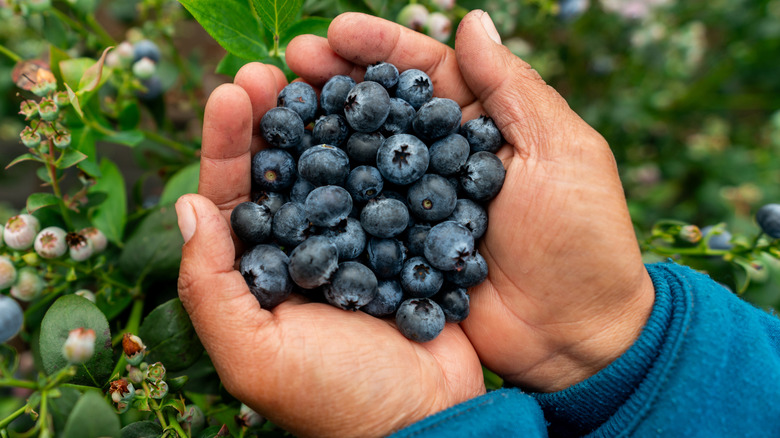What Happens To Your Memory When You Eat Blueberries Every Day
When it comes to the top go-to fruits among adults in the United States, blueberries ranked among the 10 most popular at the beginning of 2025, according to YouGov. And why shouldn't they? They're a sweet, affordable food that can be both an ingredient (like in an avocado blueberry smoothie) and a standalone snack.
Blueberries are what you might describe as "functional." That is, they're so jammed with nutrients that they have multiple potential health benefits, including more efficient cognitive functioning in a few key areas. In a 2022 study in Nutrients, overweight subjects between ages 50 and 65 who had been diagnosed with cognitive impairment ate a pre-measured amount of blueberry powder each day for 12 weeks. Before and after the 12-week period, the subjects were given tests designed to quantify different areas of memory. The results showed neurocognitive improvements, suggesting that blueberry consumption might reduce the risk of dementia. (Here are other ways eating blueberries every day benefits your health.)
But why? According to both the study and registered dietitian Maggie Moon, the answer could be anthocyanins, antioxidant compounds found in blueberries.
Rich in neuroprotective antioxidant compounds
"Anthocyanins are not only what make blueberries blue," explained Moon. "They are powerful antioxidants that researchers believe are a big reason blueberries are linked to enhanced short-term and long-term memory, spatial awareness, and a reduced risk of cognitive decline and Alzheimer's disease." A 2025 article from Nature Medicine noted that as adults age, their chance of being diagnosed with dementia increases. And this could have widespread societal repercussions, given that the rate of people living with dementia is expected to nearly double between 2020 and 2060.
Of course, you have to be cautious about how you eat your blueberries. If you simply add them to a high-fat muffin batter (muffins are one of those fast food items with way more calories than you expected), you may be negating their nutritious value. A 2023 article in JAMA Neurology found a corresponding link between cognitive decline and eating high quantities of ultra-processed foods. Therefore, it may be a good idea to learn how Moon recommends preparing and eating blueberries. (Aside from just having a handful of fresh ones, of course, which she is fond of doing to get an "undiluted dose" of antioxidants, fiber, vitamins, and minerals.)
True-blue recipes for your mouth and mind
Moon said that enjoying fresh or frozen blueberries was preferable to first cooking them, since cooking may reduce their antioxidant content. Authors of a 2013 study in the Journal of Agricultural and Food Chemistry found that cooking and baking could reduce the amount of anthocyanins in blueberries by between 10% and 21%. Interestingly, when wild blueberries were tested in a similar manner for a 2009 study in the International Journal of Food Sciences and Nutrition, their antioxidant content remained stable after being exposed to heat.
As a result, you might want to seek out wild blueberries for the most nutritional one-two punch. And if you do, you may want to start with the packaged versions in your favorite grocery. Said Moon, "Frozen wild blueberries lock in peak flavor and nutrition, with more antioxidants than regular blueberries. Enjoy them in a simple smoothie with soy milk, a dash of vanilla, and a sprinkle of cinnamon."
You could also turn blueberries into a festive red, white, and blue salad, according to Moon. Just combine pieces of watermelon, blueberries, and soft goat cheese with fresh lemon juice and black pepper. Or if you're looking for a mental pick-me-up after you get up, you can add some blueberries to your hot oatmeal, overnight oats, or yogurt.


